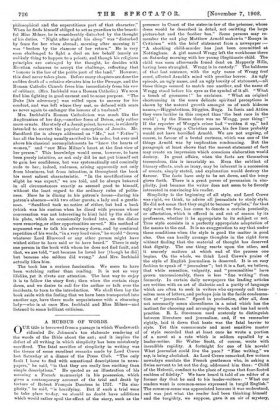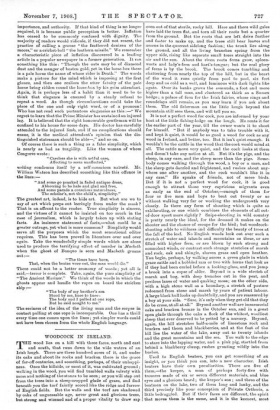A HUBBUB OF WORDS.
presence in Court of the sister-in-law of the prisoner, whose dress would be described in detail, not omitting the large picture-bat and the feather boa." Some persona may re- member the sad play Matthew Arnold makes-in "Essays in Criticism " with the brief statement from a newspaper :— "A shocking child-murder has just been committed at Nottingham. A girl named Wragg left the workhouse there on Saturday morning with her young illegitimate child. The child was soon afterwards found dead on Mapperly Hills, having been strangled. Wragg is in custody." The baldness of that last sentence, with the ugly name of Wragg tout court, affected Arnold's mind with peculiar horror. An ugly episode, an ugly name, and an ugly brevity of statement,—all these things seemed to match one another, and the name of Wragg stood before his eyes as the symbol of it 411. "What a touch of grossness !" he exclaims. " What an original shortcoming in the more delicate spiritual perceptions is shown by the natural growth amongst us of such hideous names,—Higginbottom, Stiggins, Bugg. In Ionia, and Attica they were luckier in this respect than `the best race in the world' ; by the Ilissus there was no Wragg, poor thing !" If the reporter of Wragg,'s crime had " written it up," bad even given Wragg a Christian name, his few lines probably would not have horrified Arnold. We are not arguing, of course, in favour of a brutal curtness, which was one of the things Arnold was by implication condemning. But the paragraph at least shows that the merest statement of fact may create an impression which conscious elaboration would destroy. In great affairs, when the facts are themselves tremendous, this is invariably so. Even the subtlest of literary effects, such as irony, may be inherent in a.succession of events, simply stated, and explanation would destroy the flavour. The facts have only to be set down, and the irony glows forth. There is a great power of persuasion in sim- plicity, just because the writer does not seem to be fiercely interested in convincing his reader.
Simplicity is the beginning of all style, and Lord Crewe was right, we think, to advise all journalists to study style. He did not mean that they ought to become "stylists," for that ugly word, we fear, has come to denote a certain preciosity, or affectation, which is offered in and out of season by its professors, whether it be appropriate to its subject or not. True style consists in a perfectly appropriate adaptation of the means to the end. It is no exaggeration to say that under these conditions when the style is good the matter is good also. One can hardly arrange thoughts in the right form withbut finding that the material of thought has deserved that dignity. The one thing reacts upon the other, and it scarcely matters at which end of the process one begins. On the whole, we think Lord Crewe's praise of the style of English journalism is deserved. It is an easy fashion to speak of " journalese "; but it is a fact, we believe, that while sensation, vulgarity, and "personalities" have grown unconscionably, there is less " fine writing " than formerly. In certain daily newspapers the leading articles are written with an art of dialectic and a purity of language which are often to seek in writers who expressly call them- selves men of letters, and perhaps join in the facile condemna- tion of " journalism." Speed in production, after all, does not necessarily mean slovenliness in a mind which has the instinct for choosing and arranging words, and has had much practice. R. L. Stevenson used austerely to distinguish between literature and journalism, and, if we remember rightly, laid it down that baste was the fatal barrier to style. Yet this consummate and most sensitive master of style recorded that at least once he wrote a portion of a novel at a rate which is seldom equalled by a leader-writer. Sir Walter Scott, of course, wrote with incredible rapidity. A fortnight for one of his novels! What journalist could live the pace P "'Fine writing," we say, is being abolished. As Lord Crewe remarked, few writers nowadays emulate the French gentleman who, in asking a Swiss servant to let out the dog, addressed him thus : " Child of the Helvetii, conduct to the place of egress that four-footed emblem of fidelity." We have heard it told of an editor of a former day that he said to his leader-writers : " What our readers want is common-sense expressed in turgid English." The common-sense was appreciated because it was understood, and was just what the reader had been thinking himself and the turgidity, we suppose, gave it an air of mystery, importance, and authority. If that kind of thing is no longer required, it is because public perception is better. Inflation has ceased to be commonly confused with dignity. The majority of readers would ridicule, if they did not resent, the practice of calling a grouse "the feathered denizen of the moors," or a cricket-ball "the leathern missile." We remember a characteristic piece of inflation discovered in a leading article in a popular newspaper in a former generation. It ran something like this : "Though the oats may be of diamond dust and the manger of beaten gold, yet in the loose-box there is a pale horse the name of whose rider is Death." The words make a picture for the mind which is imposing at the first glance, and then one realises the utter fatuity of the pale horse being ridden round the loose-box by his grim attendant.
Again, it is perhaps less of a habit than it used to be to think that elegance is ensured by a steady refusal to repeat a word. As though circumlocutions could take the place of the one and only right word, or of a pronoun!
Who has not read such portentous elegancies as this :—" We regret to learn that the Prime Minister has sustained an injured leg. It is believed that the right honourable gentleman will be confined to his house for some days. His doctor has carefully attended to the injured limb, and if no complications should ensue, it is the medical attendant's opinion that the dis- tinguished statesman should be able—," and so on.
Of course there is such a thing as a false simplicity, which
is nearly as bad as turgidity. Like the woman of whom Congreve wrote :
"Careless she is with artful care, Affecting to seem unaffected," writing condemns itself by a self-conscious naivete. Mr. William Watson has described something like this offence in the lines :— " And some go pranked in faded antique dress, Abhorring to be hale and glad and free, And some parade a conscious naturalness, The scholar's, not the child's, simplicity."
The greatest art, indeed, is to hide art. But what are we to say of art which peeps out leeringly from under the mask ? That is an affront to the reader. True simplicity is sincere, and the virtues of it cannot be insisted on too much in the case of journalism, which is largely taken up with stating facts. An insincere statement of facts,—what could be a greater outrage, yet what is more common? Simplicity would serve all the purposes which the most sensational editor requires. This has been proved in literature over and over again. Take the wonderfully simple words which are alone
used to produce the terrifying effect of murder in' Macbeth when the ghost of Banquo is seen and Macbeth groans
out "The times have been,
That, when the brains were out, the man would die."
There could not be a better economy of words ; yet all is said,—terror is complete. Take, again, the pure simplicity of "The Ancient Mariner." We think of the words in which the ghosts appear and handle the ropes on board the stricken ship :— " The body of my brother's son Stood by me, knee to knee :
The body and I pulled at one rope, But he said nought to me."
The eeriness of the idea of the living man and the corpse in contact pulling at one rope is incomparable. One has a thrill every time one comes upon the lines ; yet simpler words could not have been chosen from the whole English language.





























































 Previous page
Previous page